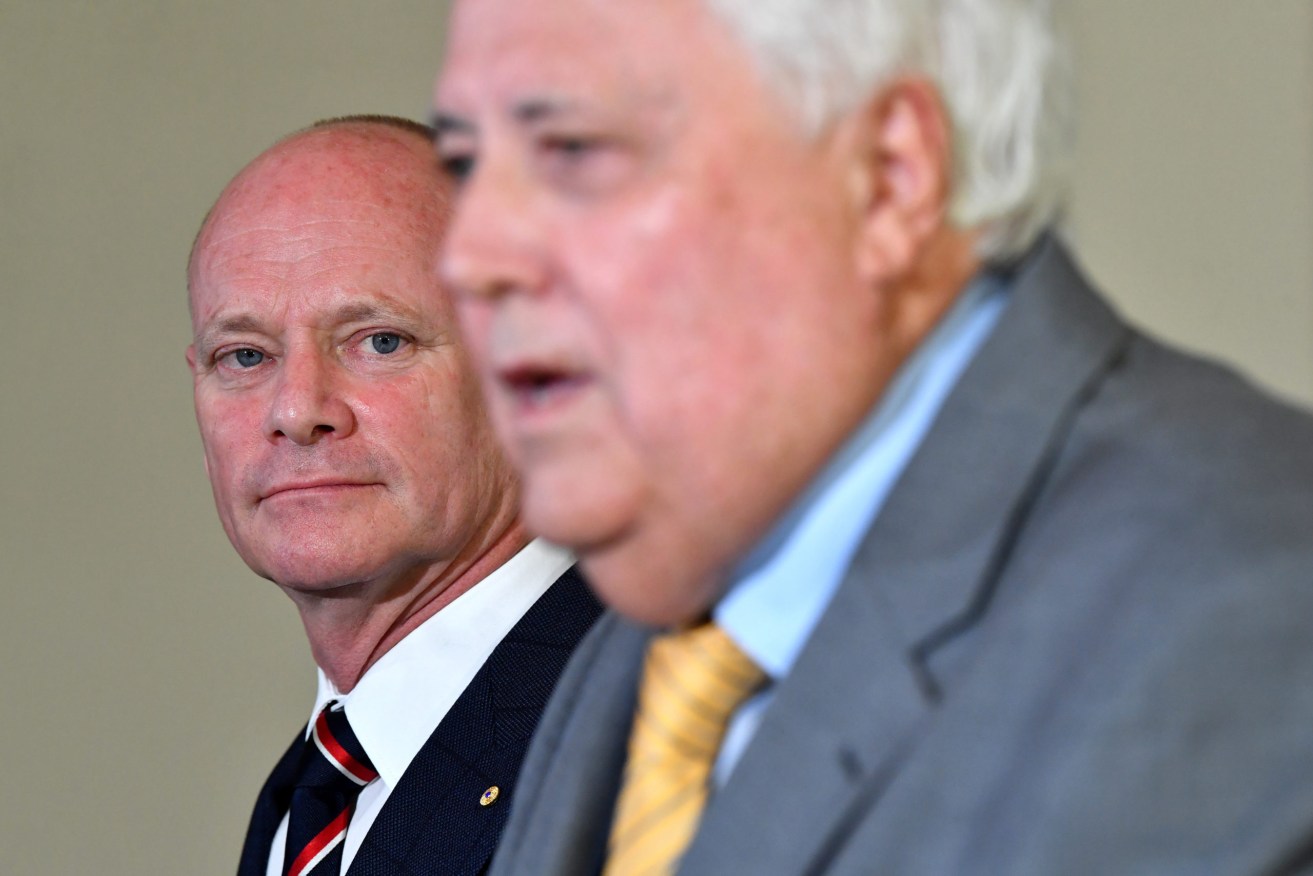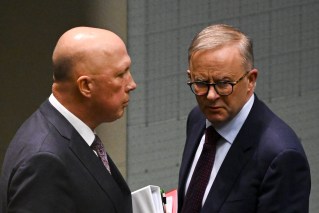A candidate like no ‘other’ – Newman talks up his Senate claims as minor parties surge
He seized power in a record electoral landslide and was thrown out of office in equally dramatic circumstances – now former premier Campbell Newman has been reduced to talking up his votes from the “Others” column in the latest polls.

Liberal Democrats Senate candidate Campbell Newman (left) and United Australia Party Leader Clive Palmer (right) speak to the media during a press conference in Brisbane November. The parties will exchange preferences at the next Federal Election. (AAP Image/Darren England)
Newman this week claimed the Liberal Democrats, of which he is now a member, will be a “major force” in the upcoming Federal election.
And what’s more, he says it’s time for the media to pay more attention to the micro party.
He points to the latest Newspoll results, which show that “Other” parties have increased from 11 per cent to 14 per cent of the primary vote.
The former LNP Premier resigned from politics in 2015 after a thrashing by the Labor Party and the loss of his own seat.
But, he’s not done yet with politics and recently announced his intention to stand as a LibDems candidate for a Queensland senate seat in the Federal election, due by May.
But he’s got a steep hill to climb if an analysis of Newman’s poll results over the years are anything to go by.
A 14 per cent reading in the “Other” column is a far cry from the days when opinion polls put Newman at 50 per cent of the preferred Premier vote or the day he won his own seat and was crowned Premier, with almost 52 per cent of the vote.
Newman says that in the latest Newspoll, the “Other” that is referred to is basically the LibDems and Clive Palmer’s United Australia Party.
That’s the same UAP which has already spent millions on yellow billboards in the run up to the election campaign in which Palmer has boasted he will fork out at least $100 million.
Palmer himself intends running for the Senate and the boost in the poll results of the “Others” may well be the result of Palmer’s cash splash.
Newman says: “The three percentage-point jump is equal to a 37 per cent increase in our support. This confirms the LibDems message of providing a sensible alternative to the major parties is already resonating strongly with voters.”
He says that One Nation and the Greens are counted separately from Other in the poll category and both of those have declined in the latest poll, to 3 three per cent and eight per cent of the primary vote.
Once a Liberal National, Newman resigned from the party in July 2021, claiming the party had lost its soul and abandoned its true liberal values.
He says he is now a proud LibDem.
So what’s his record like?
Let’s start in March 2011, when then LNP leader John-Paul Langbroek, resigned in the face of internal polling showing that he couldn’t win the 2012 election. Newman, then outside parliament, was installed as the leader-in-waiting.
A Galaxy poll gave him a 51 per cent rating as preferred Premier, compared to then Premier, Anna Bligh.
By January 2012, Newman was sitting at 49 per cent and Bligh was on 40 per cent for preferred Premier.
And in March 2012, in his own seat of Ashgrove, Labor’s Kate Jones was leading Newman 50.7 per cent to 49.3 per cent, according to a poll.
On poll day, Newman won the seat with almost 52 per cent of the vote, and the LNP notched up a historic victory, leaving the ALP with just seven of the 89 seats in Parliament.
Fast forward to May 2013. A Galaxy poll had Newman, as preferred Premier, at 55 per cent with then Opposition leader, Annastacia Palaszczuk, trailing at 29 per cent.
By 2015, week one of that State Election campaign, a Galaxy poll had Newman, as preferred Premier, at 45 per cent compared to then Opposition leader, Annastacia Palaszczuk, at 40 per cent.
It wasn’t to last.
The LNP suffered a massive swing. Labor won 44 seats and the LNP 42. Newman lost his seat and resigned.
Now he’s back for another tilt.
“Australians are fed up with both the Labor-Greens and the Liberal National coalition and looking for an alternative. But they want alternatives led by people who have deep leadership experience in business and the real world,” Newman says.
“People are sick of the ‘Canberra class’ of career politicians and bureaucrats playing musical chairs with our country and our kids’ futures.”












